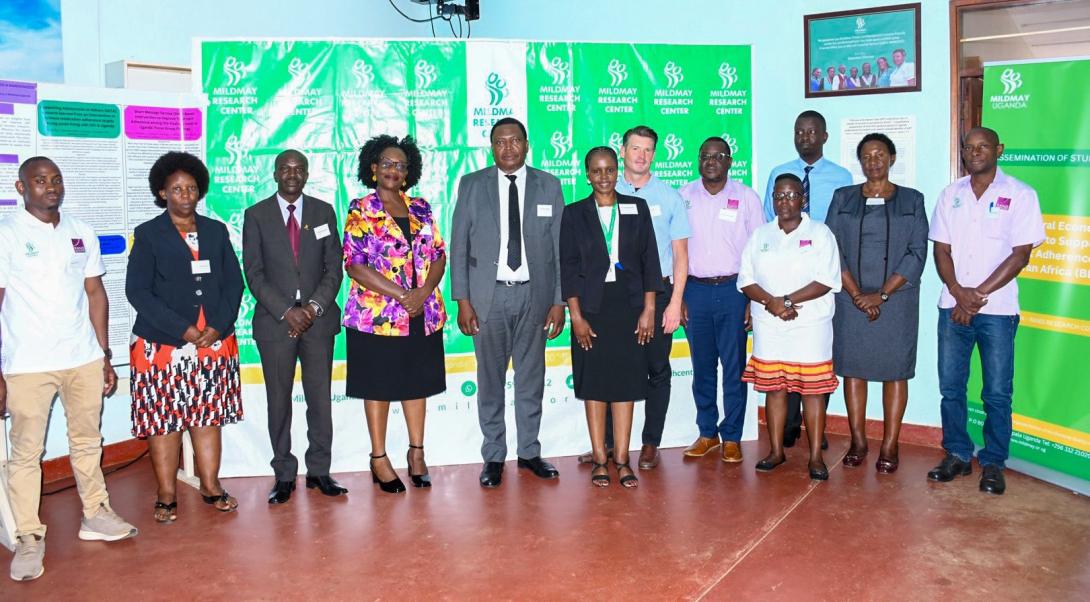On June 26th 2024, the Mildmay Research Centre Uganda proudly hosted an important event at Suubi Hall: the dissemination of findings from the Behavioral Economics Incentives to Support HIV Treatment Adherence in Sub-Saharan Africa (BEST) study. The keynote speaker, Professor Sebastian Linnemayr of the RAND Corporation and Principal Investigator of the BEST Study, presented the results of this critical study, which focuses on innovative approaches to improving HIV treatment adherence. The event attracted a diverse audience of researchers, healthcare professionals, and community leaders, all eager to engage with the study’s findings and explore its potential impact.
The BEST study, led by Professor Linnemayr, explores the significant role behavior plays in determining the success of HIV treatment protocols. Central to the study is the idea that human tendencies—such as forgetfulness and procrastination—can hinder the consistent adherence to Antiretroviral Therapy (ART). Professor Linnemayr's address emphasized the importance of understanding these behavioral factors to develop better interventions. He captured the essence of the study with his statement: "Behavior matters; we are only human with tendencies to forget and procrastinate." This message echoed throughout the event, underscoring the need for interventions that take into account human behavior to improve health outcomes for individuals living with HIV.
Dr. Yvonne Karamagi, Executive Director of Mildmay Uganda, opened the event by highlighting the long-standing collaboration between Professor Linnemayr and Mildmay. She praised the study for its innovative exploration of behavioral economic strategies that have the potential to transform HIV treatment adherence. Dr. Karamagi also acknowledged the many pressures that can affect adherence, noting that life’s demands often make it difficult for individuals to consistently follow treatment regimens. She expressed optimism that the interventions examined in the BEST study could significantly improve adherence and quality of life for those living with HIV. <p><p>A special address was delivered by Dr. Olaro Charles, Director of Clinical Services at the Ministry of Health, who had previously launched the BEST study in 2018. He encouraged attendees to learn from the study and to seek out further research opportunities within their local environments. Dr. Olaro emphasized that impactful research often originates from everyday observations and community engagement. His call to action encouraged attendees to adopt a grassroots approach to scientific inquiry, driving research that directly benefits local communities.
The BEST study enrolled 329 participants who were divided into three distinct groups:
Usual care (control group): 109 participants
Adherence-linked incentives: 111 participants received prizes for achieving ≥ 90% adherence to ART
Clinic-linked incentives: 109 participants were awarded prizes for keeping their clinic appointments
Over a 12-month period, participants in the intervention groups had the opportunity to win larger prizes, with the aim of improving adherence to ART and viral suppression. While the overall findings showed no significant improvement in viral suppression or adherence across all participants, the incentives proved particularly effective among those who initially exhibited low adherence. This insight reveals that targeted interventions can make a meaningful difference for specific subgroups, presenting a valuable opportunity for future research.
Lillian Lunkuse, the BEST Study coordinator, presented the findings with enthusiasm, sharing valuable insights from both the research team and the participants. Her presentation covered client perceptions, team experiences, and the role of prize draw incentives in engaging participants. Ms. Lunkuse invited the audience to participate in prize draws, replicating one of the study’s behavioral interventions and allowing attendees to experience firsthand the excitement it generated among participants. This interactive element highlighted the emotional engagement and personal empowerment that the study's incentive model fostered, demonstrating the impact of behavioral economic strategies on treatment adherence.
The event concluded with remarks from Dr. Ronald Mulebeke, Director of the Mildmay Research Centre Uganda (MRCU). Dr. Mulebeke emphasized the growing importance of behavioral studies in advancing Implementation Science and reaffirmed MRCU's commitment to conducting high-quality research. He celebrated the Centre’s ongoing efforts to pioneer innovative health solutions that can transform lives, reinforcing Mildmay’s mission to improve health outcomes through research and community engagement.
